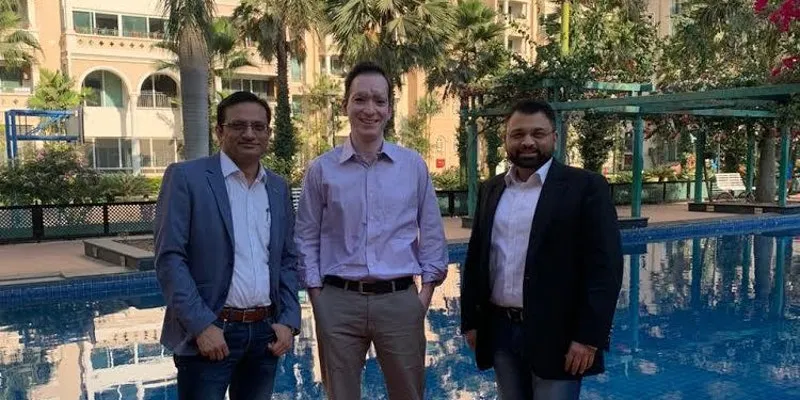Why these three bankers decided to start another accelerator for startups
In conversation with YourStory, Rohit Dak, Managing Partner of Zeolyt Accelerator, speaks about the need for another accelerator, what his team looks for, and how it benefits early-stage startups.
Rohit Dak, Pawan Borar, and Pankaj Thakkar have all been in the banking and financial sector for close to two decades now. A part of the M&A world, they have seen organisations work on regulatory aspects, deal with credit assessments, grow, and scale.
The trio, who have known each other for a while now, often discussed the fact that early-stage startups needed support and help at many levels.
This pain point led them to start Bengaluru-based startup accelerator Zeolyt in 2018. The accelerator funds tech-enabled, early-stage startups in India and APAC, catalysing journeys of entrepreneurs with investments, complementary skills, and support.

The three founding partners of Zeolyt: Rohit Dak, Pawan Borar, and Pankaj Thakkar.
The founding trio has ample experience between them.
Rohit, an MBA from the University of Illinois, has primarily worked in the US with HSBC, Walmart, and Schneider Electric, managing finance, operations, strategy, and procurement functions. Pawan has worked in M&A, business development, investment banking, and product development.
Pankaj, who started his career with ING Vysya Bank in 2001, has worked extensively on credit assessment of large local corporates and advised MNCs on fund raising, capital structuring, cash management, foreign exchange risk, and regulatory aspects.
Together, they set up Zeolyt with one aim: to nurture innovation and create capital-light and high return avenues for its investors.
In a conversation with YourStory, Rohit explains what Zeolyt does, how it works, and why they chose to start another accelerator in India’s Silicon Valley.
Edited excerpts of the interview:
YourStory: Why did you think of setting up an accelerator?
Rohit Dak: We wanted to create an ecosystem of support for early-stage startups, for which we surveyed needs of founders. We found that there were needs beyond funding in early stages. That’s when we pushed our initial idea of creating our own fund by six months.
We focused on on-boarding startups, consulting with them, and getting them investment-ready. We have partnered with many established VCs and HNIs to fulfil the funding needs of our startups.
Secondly, and most important, was the idea of paying it forward. Each partner had spent close to 20 years managing large organisations, and we wanted to help and accelerate journeys of young companies.
Thirdly, research has proven that accelerators have a positive impact on the growth of companies. We do a lot of hand holding, from valuation, pitch presentations, and mock sessions to deal structuring, due diligence assistance, and support for deal closure.
YS: How does the accelerator work?
RD: Zeolyt Accelerator is designed for and focused on early-stage startups and founders. We offer the following services:
- Mentoring/advisory: Review and refinement of business strategy, marketing, pricing, operations, and business processes.
- Product consulting: Feedback on vision, market fit, features, pivoting, and roadmap.
- Drive quick experiments based on a testable hypothesis to learn and evolve faster.
- Growth acceleration: Organic/inorganic growth strategy and support. Explore strategic partnerships and new business models.
- Business performance framework: KPI framework, review, and insights.
- Industry networking: Networking opportunities with industry leaders.
- Access to domain and technical experts: Dedicated time with thought leaders to help find solutions to the most complex challenges.
- Introductions to service partners: Introduction to software product development, legal, finance and accounting, talent on-boarding, executive coaching partners.
- Education and support: On business planning, financial modelling, revenue projections, design thinking, storytelling, and other areas, as needed.
The initial term of the programme is six months; this can be extended as per mutual agreement. Actual services depend on a startup’s specific needs.
YS: How is Zeolyt different from others in the space?
RD: We understand the needs of an early startup when cash is very important. We have created multiple commercial models where founders don’t need to shell out any cash to partner with us. Most things are well defined in advance and we work on a success fee model.
This way, our partnership with startups does not become a financial burden for the founders.
We provide access to international and industry-specific markets. Also, we don’t compete with other accelerators, venture capitalists, and incubators in the market. Instead, we partner with them. We focus on our core strength and on-board startups that can benefit from our partner network.
Our team has a network of startup advisors who bring rich experience and are currently at CXO or leadership level in corporate settings. Advisors help startups challenge assumptions and support acceleration.
YS: What startups can be a part of the accelerator and how are they selected?
RD: Our focus is sector-agnostic. At early stages, we look for a strong idea, qualified founders, and the problem statement. At high level, our selection criteria includes maturity of the firm, problem/solution fit, market fit, business model, qualified team, return on investment, investment risk, and customers.
YS: How many startups are part of the programme?
RD: We have signed up six startups at this stage in different verticals, including edtech, foodtech, sports, and B2B solutions.
YS: What are your plans for the future?
RD: We are going to apply for our own fund in three months. We plan to launch a tech-enabled platform and grow our team of management consultant and advisors. We also want to bring 50 startups under our umbrella in 2020, and get our startups funded.
YS: Do you have any advice for startups and founders?
RD: Learn to say no, and learn to tell stories. As an entrepreneur, it is important that you are always ready to sell. Don’t focus on the uncertainty. Don’t create Plan B. Focus on the current situation and try making it work by understanding your market and product. Surround yourself with supportive folks. Also keep yourself healthy physically and mentally; it is a long journey.
(Edited by Teja Lele Desai)




![[YS Exclusive] London will be a key market for Ola this year: Simon Smith, Head of International Ops](https://images.yourstory.com/cs/2/a9efa9c02dd911e9adc52d913c55075e/OlaUKlaunch1553833622601-1580655125314.png?fm=png&auto=format&h=100&w=100&crop=entropy&fit=crop)




